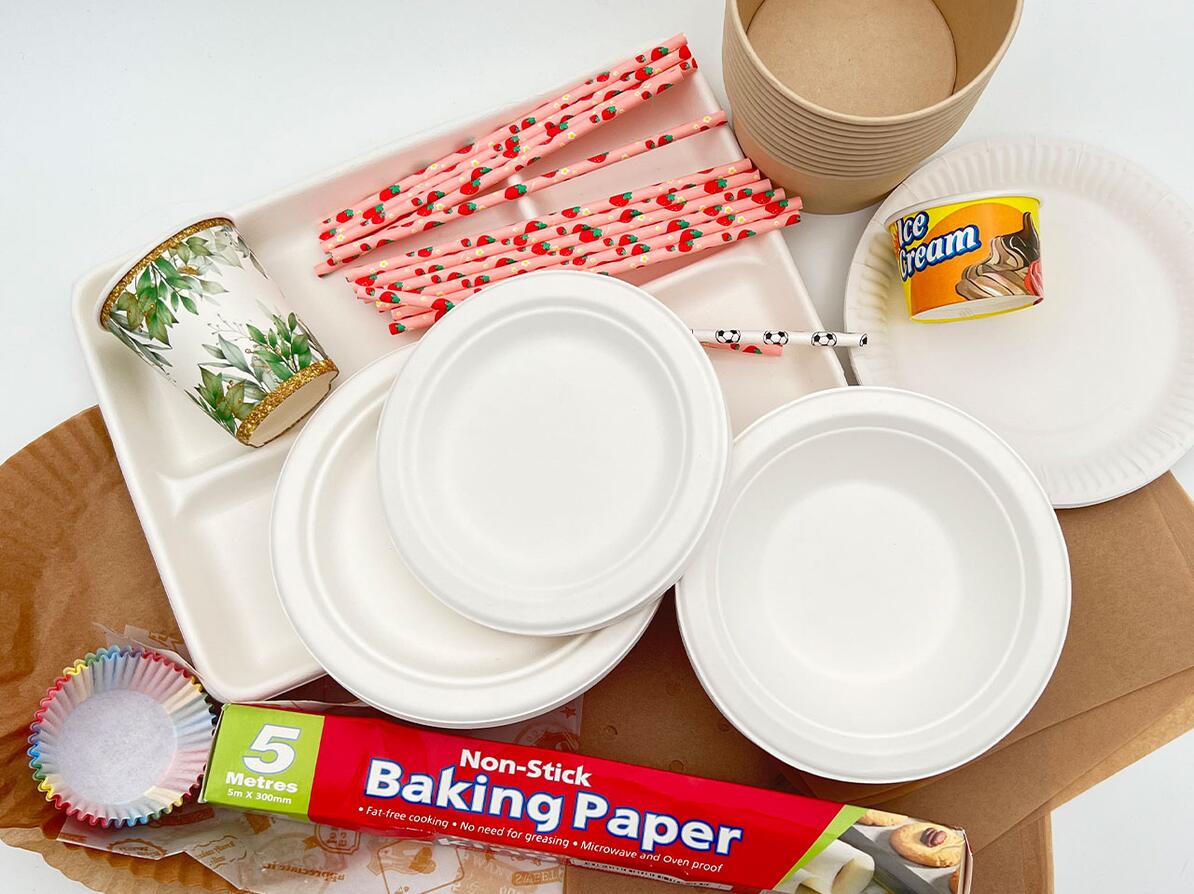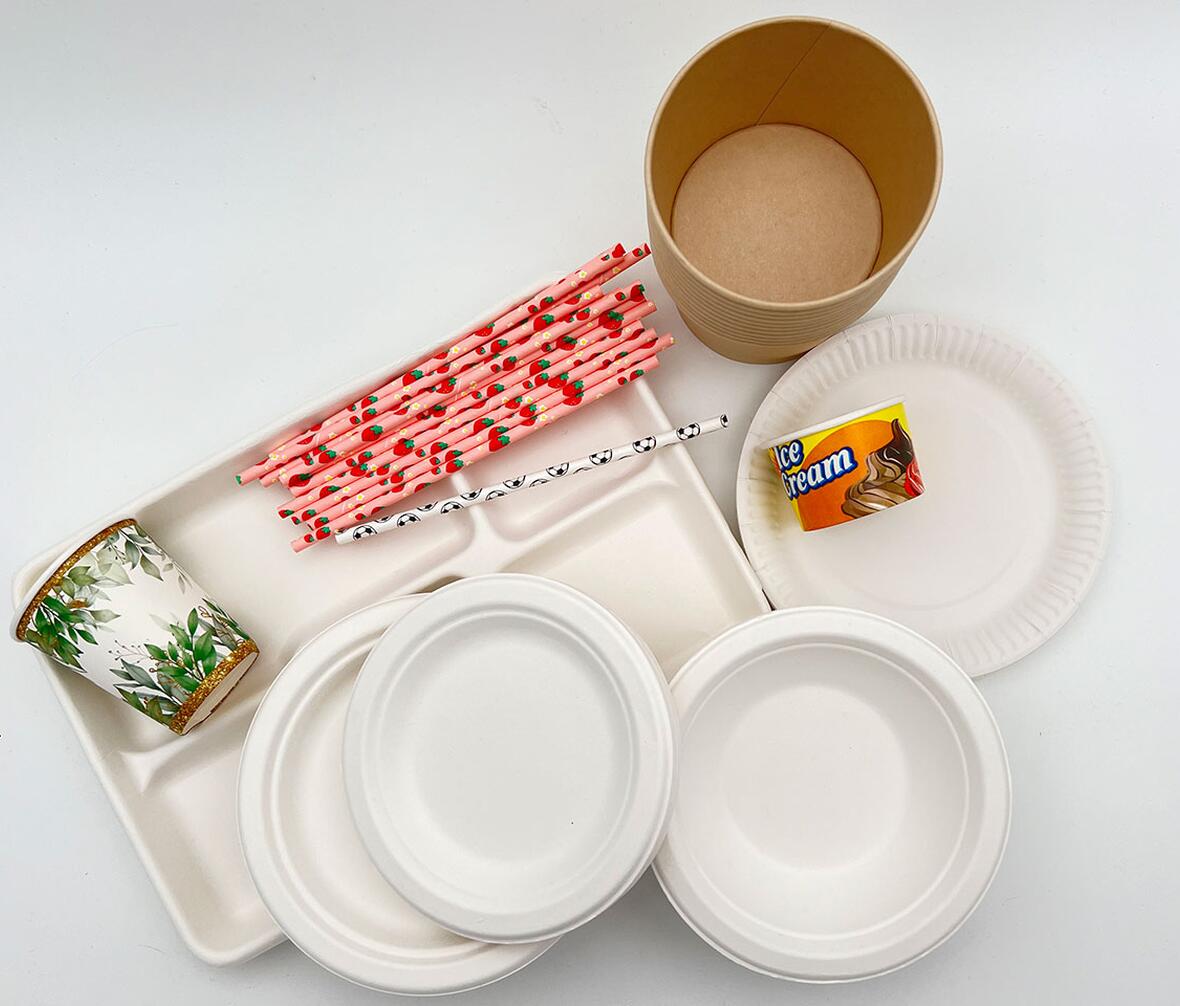PFAS found in disposable tableware from Temu
Most paper plates, bowls, cups, and paper straws from Temu contain excessive amounts of PFAS, according to our new investigation.

Disposable tableware for children's birthdays, parties, or picnics is not a good idea to buy from Temu. Several products in our new investigation contain harmful PFAS, which are prohibited in Denmark in paper and cardboard that come into direct contact with food.
PFAS can give products like disposable plates and straws a water- and stain-resistant surface to make the products capable of withstanding contact with wet or greasy food. However, PFAS - also known as "forever chemicals" - accumulates in our bodies over time and can lead to lowered immune function, increased cholesterol levels, liver damage, and several other health problems.
“In some cases, we find very high amounts of organic fluorine, and it’s our clear assessment that several of the products from Temu violate Danish regulations, which are in place to protect us from harmful PFAS,” says Stine Müller, test manager at The Danish Consumer Council THINK Chemicals.
Illegal substances in festive paper tableware
We purchased 16 types of paper and cardboard packaging from Temu and sent them to analysis of total organic fluorine at an accredited laboratory. Total organic fluorine (TOF) is a measure of the total amount of PFAS in the material. We do not know which specific PFAS substances are present.
We tested 10 types of disposable tableware, including paper plates, cups, bowls, and paper straws, as well as six types of baking paper, such as muffin cups and baking paper for air fryers.
Nine out of 10 paper and cardboard tableware items contain problematic fluorine substances in quantities that indicate they were intentionally added. This is not permitted in Denmark.
“In five products, the amounts are so high that we suspect PFAS has been used to make the material water- and stain-resistant. In other cases, the lower amounts may be due to the use of PFAS in printing ink or contamination from recycled paper and cardboard. Regardless of the cause, PFAS is not allowed” says Stine Müller.
- Five products contain PFAS levels that are 10 to 50 times higher than what is allowed in paper and cardboard in direct contact with food (210 to 1,300 mg/kg of total organic fluorine)
- Four products contain PFAS levels that are just above or up to three times over the permitted amount in paper and cardboard in direct contact with food.
- One product contains PFAS in exactly the amount allowed in Denmark.
The Danish Veterinary and Food Administration has set a so called indicator value of 20 mg/kg. If the content exceeds this level, PFAS use is assumed.
20 mg/kg of PFAS
The Danish Veterinary and Food Administration has introduced a threshold for total organic fluorine in paper and cardboard food packaging of 20 milligrams per kilo of paper.
If the content is lower than 20 mg/kg, it is considered to be legal, unintended background contamination in the product. If the product exceeds 20 mg/kg, PFAS use is assumed, and the material must not be in direct contact with food unless there is a functional barrier that prevents PFAS from transferring to the food.

When PFAS is found in paper and cardboard packaging, the Danish Veterinary and Food Administration requires a functional layer in the product to prevent the transfer of PFAS to food.
“These products only comply with Danish regulations if they have a barrier ensuring that PFAS cannot be transferred to the food. We believe that this is not the case for most of the tested products, and no companies have yet confirmed that this is the case,” says Stine Müller.
In the six types of baking paper, the PFAS content is low and complies with Danish regulations. According to Stine Müller, this does not necessarily mean that baking paper from Temu is a good choice.
“We have only tested Temu’s baking paper for PFAS content and not for other unwanted chemicals. Even though we didn’t find PFAS in the baking paper, we still encourage consumers to buy baking paper from Danish retailers, preferably with the Nordic Swan Ecolabel, which sets stricter requirements for chemicals,” she says.
PFAS in bagasse
There is a high likelihood of finding large amounts of PFAS in disposable tableware made of cardboard produced from sugarcane fibers, known as bagasse. This is often due to the fact that sugarcane fibers are treated with PFAS before being pressed together.
The Danish Veterinary and Food Administration reports that they have not yet investigated bagasse products on the Danish market but are in the process of conducting control checks on companies selling bagasse products to ensure compliance with the Danish ban on PFAS. The Danish Veterinary and Food Administration expects to publish the results in early 2025.
At The Danish Consumer Council THINK Chemicals, we have previously tested paper plates, bowls, and cups made of bagasse for unwanted chemicals. Among other things we found PFAS in the material. The test was conducted before the Danish ban came into force. According to the rules, these substances should no longer be present in products sold in Danish stores.
Temu hinders Denmark’s efforts against PFAS
It can be difficult to distinguish between a white paper plate from a supermarket and one you buy on Temu. However, the chemicals you are exposed to may vary greatly.
A specific PFAS-legislation in Denmark prevents disposable tableware from containing these unwanted chemicals.
“Since 2020, it has been illegal in Denmark to add PFAS to products like paper plates or straws, as large amounts of PFAS can cause harm to the immune system and raise cholesterol levels in the blood. Since PFAS is still legal and widely used in many countries, this investigation serves as an important reminder to consumers that they are taking a health risk by purchasing these types of products on webshops like Temu,” explains Henrik Dammand Nielsen, head of unit at the Danish Veterinary and Food Administration.
Temu was recently named Danes’ second most preferred webshop, right after Zalando, which could hinder important efforts to combat harmful chemicals like PFAS unless the platform ensures that the products it sells comply with both EU legislation and national regulations and bans.
Temu must therefore bear the same responsibility as other importers – a so-called importer liability. According to the Danish Veterinary and Food Administration, it is not possible to inspect items from Temu.
“The Danish Veterinary and Food Administration does not have the ability to inspect or enforce Danish or European regulations in countries outside the EU. We can only inspect products once they have been imported into Denmark. As we do not conduct control checks in private homes—such as consumers who have ordered disposable cups or straws from outside the EU—we can only inform about the risks this poses,” says Henrik Dammand Nielsen.
The Danish Veterinary and Food Administration thus urges individual consumers to exercise caution when purchasing kitchenware or disposable tableware from webshops outside the EU:
“The products may contain harmful chemicals such as PFAS, lead, phthalates, or bisphenols. Since neither Danish nor European authorities inspect webshops outside the EU, consumers cannot be sure that the products meet EU chemical regulations. It is therefore always a good idea to be especially careful with products for food preparation and check where the items are being shipped from,” says Henrik Dammand Nielsen.
Temu’s response
Thank you for bringing this to our attention. We took immediate action after receiving the report. All 10 relevant products have been removed from sale pending an investigation. At Temu, product safety is of paramount importance. We are committed to complying with all relevant laws and regulations in our markets and hold our third-party sellers to the same standards. Since entering the Danish market just over a year ago, we value feedback from customers, regulatory authorities, and consumer groups. When issues arise, we are committed to resolving them quickly and improving our services to ensure a safe and pleasant shopping experience for all.
The Danish Consumer Council THINK Chemicals has also contacted the companies that, according to Temu, are behind the tested products. We have heard from two of them, but neither has confirmed that their products have a barrier ensuring that PFAS substances cannot transfer to the food.